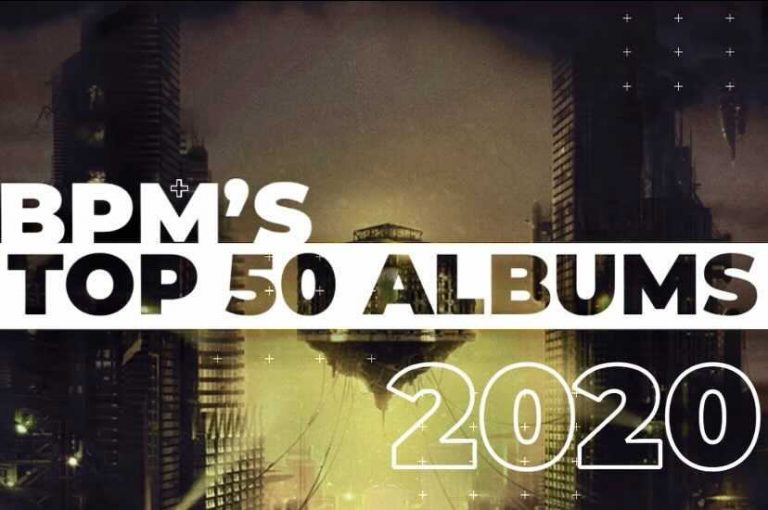
10.
Moses Sumney – græ
[Jagjaguwar]
Sure, Moses Sumney impressed back in 2017 when he emerged with the eclectic blend of art rock, pop, hip hop, folk, and jazz, but with 2020’s græ, he’s really pushed himself over the edge. A highly ambitious double album, græ maintains and refines Sumney’s knack for blending genres and styles, employing a dazzling array of rubbery guitars, thick basslines, glistening keyboards, and a plethora of beats and textures. Across the 20 tracks here, we get ruminations on gender, identity, race, and heartbreak, led by Sumney’s improbably gorgeous voice, a truly one-of-a-kind instrument; malleable and laser-focused.
While a 20-song album may sound daunting, Sumney has sequenced it with such grace that it flows like water, washing over you while also drawing you in instantly. On the first disc, after a brief spoken-word intro, we get tracks as varied as the slinky “Cut Me”, the ambient-rock of “Gagarin”, and spacey horn-flecked “Colouour”. “Neither/Nor” alone skates through driving jazz-inflected pop alongside folksy guitars, and “Polly” gives us a staggeringly naked vocal-and-guitar ballad to close things out. Best of all is “Virile”, an industrial, infectious art pop monster of a track, Sumney meditating on ideas of masculinity in our society.
The second disc is much sleepier, and that isn’t a bad thing. Sumney has proven in the past that he can work wonders with minimalist soundscapes, such as on his astonishing, time-stopping “Doomed” from 2017. “Two Dogs” and “Bystanders” usher us in with slow, groaning instrumentals and Sumney’s piercing, airborne voice. “Me in 20 Years” gives us a subtle beat, but the pace remains slow, with tight harmonies. “Lucky Me” has a skeletal keyboard progression as its foundation, feeling like it’s been scraped out of some quiet 80s movie.
It’s on this latter side of the album that some of the lithe and ambient qualities of his debut come back into focus, albeit sharper and bolder. It’s an easy set of songs to get lost in, but if you stop and pay attention, the finer details and lyrical insights are bountiful. One of the barest moments here, “Keeps Me Alive”, features little more than Sumney’s skyscraping falsetto singing lines like “Though I’ve never been a sucker for codependency / I’m taken by the possibility.” This naked truth is what we seek in Sumney’s music, and he delivers it here and across the other 19 tracks.
All 20 songs feel necessary to the overall arc and exploration of græ; even the interludes are intriguing and textural. While the second disc is decidedly less insistent and accessible than the first, together, the two sides make for a truly compelling whole, a vision of an artist confident in his craft, stretching out his aesthetic desires, and making no apologies along the way. – Jeremy J. Fisette

9.
ZOMBIE-CHANG – TAKE ME AWAY FROM TOKYO
[Roman Label / BAYON PRODUCTION]
“Where’s my toilet paper?” Meirin Young aka ZOMBIE-CHANG demands at the very beginning of album opener “Stay Home” – and then goes on to repeat it more times than you’d like to count, to the point where it could be the most asinine hook you’ll never get out of your head. And yet, it’s so damn lovable – and it’s not the last time that she makes an unexpectedly universal statement on her superlative new album TAKE ME AWAY FROM TOKYO. Although her propulsive and juddering techno can seem like something of a blunt instrument at times, there’s no denying its effectiveness in spreading a message of simultaneous hyperactivity and dissatisfaction. Hopping from English to French to her native Japanese across the album’s 10 tracks, she makes sure that her frustrations are heard and registered the world over.
While it may not be the most nuanced dive into the feelings that this year of hell has inflicted upon the global population, it may well be the most honest – because, really, how much can be said about being forced to stay inside for months on end? These messages come from a place of utter tedium and confusion, just spewing the thoughts that are rattling around her idle mind and combining them with beats that spawned from her gut and hit you right in yours. Whether she’s driven to a point of total loss, as on “Je Ne Sais Pas”, or a place of such boredom all she can think to do is play “Rock, Scissors, Paper”, or implementing her iPhone alarm as the crux of “Snooze”, no idea is too mundane for ZOMBIE-CHANG – and by the time she’s strapped them to her rocket-fuelled production, they become genuine anthems for a lost year of human interaction.
The title TAKE ME AWAY FROM TOKYO could have the titular city replaced by wherever each listener has been stuck for these everlasting months of ennui – we all want to escape. However, as is made evident by the opening track title “Stay Home”, ZOMBIE-CHANG is also preaching responsibility and consideration for others, and she has created a perfect accompaniment for partying in your house. Whether you’re dancing on tables, banging beer bottles against the wall, crashing on the sofa, staying up all night wired to video games, or doing whatever it is that you need to do to expend that excess energy we’ve all got, TAKE ME AWAY FROM TOKYO is the ready-made soundtrack. – Rob Hakimian

8.
Fleet Foxes – Shore
[Anti-]
For the fourth time in his life, Robin Pecknold wrote an album that perfectly summed up the present day. Back on Fleet Foxes‘ 2011 album Helplessness Blues he mused about being a cog in the big machine, and distrusting those who pretend to have his best intentions while hurting those he cared for. After a decent hiatus so that he could get his degree, the return of the beloved folk act with 2017’s Crack-Up was even more intriguing, as he delivered an album of experimentation, one that stretched typical lore and imagery into progressive rock track lengths. He did it because that’s what the times called for – the uncertainty and unpredictability of where we are and where we’re going is what life felt like. But now that it’s all behind us, 2020’s Shore gives us some reprieve.
Functioning, it would appear, as a largely solo project this go-round, Pecknold’s Shore is a warm embrace during dark times. Any chance of discovering some political allegory from all of this is moot, Shore is unabashedly a comfort record, one that is brighter and less challenging than Crack-Up but also less lore-based than their debut. It’s a record about the last four years of life in this chaotic world, and it doesn’t pick sides, it just reflects the tumultuous times we’ve all endured. Pecknold isn’t writing about being a kid with big dreams anymore, he’s writing about the acceptance of the things he can’t change (“A Long Way Past the Past”), his heroes and inspiration (“Sunblind”), and exhaustion (“Going-to-the-Sun-Road”) – things we don’t talk about in our 20s, but definitely start contemplating in our 30s as the first signs of wear and tear start to set in.
Shore wasn’t even written during the present; Pecknold had all of this ready at the end of 2019, and as things became more severe in 2020 with pandemics, murder hornets, closed businesses, and death tolls rising daily, there was no more perfect time for Shore to warm our hearts than when the leaves start to flutter and turn bright yellow and red. “I’m Not My Season” sums up Shore’s intent, and it’s one of Pecknold’s most poignant songs to date: “Holding on close / Holding on to / Any kind of ring I can bring you,” he sings, before reminding us that “Well time is not what I belong to / And you’re not the season you’re in.” Time is around us, but we are not time, we are not 2020, and as the sun sets on a hellish year, Shore will be that record that helped us get to land safely. – Tim Sentz
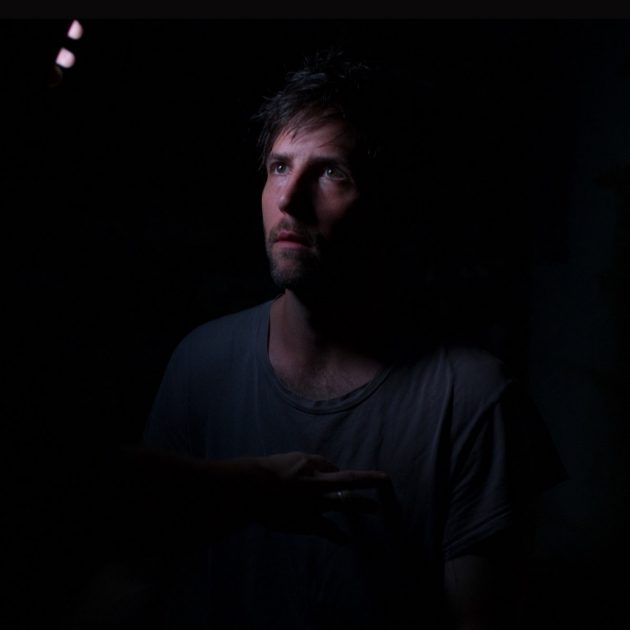
7.
Owen Pallett – Island
[Domino]
Owen Pallett’s career since they eschewed the Final Fantasy moniker has been one of the richest and most rewarding of the last decade-plus. No longer just ‘the Canadian that did string arrangements for Arcade Fire and the National,’ they’re actually taking strides over those bands’ heads in terms of conceptual storytelling. Pallett’s particular protagonist is a man named Lewis, who is used as an allegory for mankind while an absent God looks on. Lewis cries out throughout Island, “Owen, are you there?”, and we can feel his voice in our own hearts as we ask where a loving God could possibly be during such a tumultuous and painful year.
Just as Pallett didn’t leave Lewis to die at the end of the narrative of 2010’s Heartland, they didn’t leave their drooling fans to wait an eternity for more stories. In 2014, we received a teaser follow-up album in the form of In Conflict, which shed Lewis’s story to tell Pallett’s own. Now, no one’s here to trash In Conflict, but Island is the true successor to Heartland in almost every way. There’s more collaboration, more lyrics, more to Lewis’s story, and more orchestral arrangements hiding in every corner of the album, supplied by the London Contemporary Orchestra. Its grandeur is matched only by its tenderness. Look to “Polar Vortex” for what are easily the most soothing guitar harmonies we’ve heard this year. Who knew Pallett was a guitar virtuoso as much as a violinist and arranger? ‘Fess up.
Pianos, horns, and violins constantly hold up Pallett’s voice like the soft hands of the divine. In a world surrounded by lyrics like “god-killer’s alive” and “madness is a man among us,” we need a down-to-earth protagonist to guide our journey. Whether this is Pallett or Lewis is up for debate, but the words of both echo through the narratives. On “Perseverance of the Saints”, Pallett wakes from an anxious dream and is laid bare with loneliness: “Cargo on the jetty knocks me out of reverie / it is only in my lover’s arms that I can ever sleep,” they bemoan of their lack of free will. It’s a tale about really needing someone in those private waking moments. “Polar Vortex” follows as life’s mantras start to flood the mind. “Like any other man I have a code / and hold my friends to higher standards… for madness is a man / you will let the madness in.” It’s not the most comforting of thoughts, but at least we can be together in this discomfort with Pallett.
The expert sequencing then brings us to “A Bloody Morning”, which is a sweeping epic so good that it trivializes the six years since the last Owen Pallett album. Liturgy’s Greg Fox drums the pianos and horns forward in an impeccable syncopation. Above it all croons a confident Pallett, actively guiding a lost Lewis through a drunken shipwreck of catharsis and injury. What the song does is prove to patient listeners that incredible depth, beauty, pain, storytelling, and melody are always worth waiting for; and that Pallett hasn’t lost one iota of influence and ingenuity in the last decade since Final Fantasy breathed its last breath. “You don’t need to be a slave to your desiring,” says Pallett at the album’s final moments. They couldn’t be more correct. – Michael Cyrs
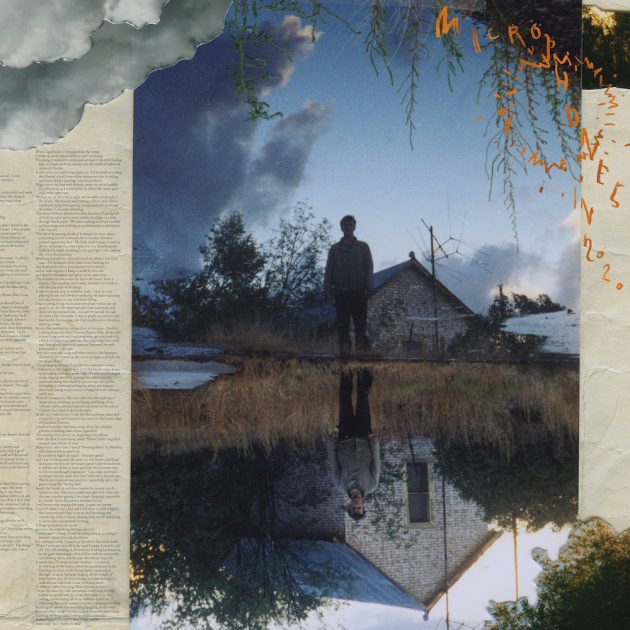
6.
The Microphones – Microphones in 2020
[P.W. Elverum & Sun]
A standard story has an exposition, rising action, climax, falling action, and of course, a resolution. But there is no plotline of this nature to Phil Elverum’s life. It rises, falls, rises, then falls again. It rises once more and even loops back to the exposition – and that’s where we find our main character, Elverum, back to where it all started, making music again under his most singular moniker, the Microphones. Though yet another wistful stroke of heartrending folk musings and soul-searching beauty, Elverum’s latest is his most boundary-pushing feat, miraculously embedded in his comfort zone. Yes, even as someone as forward-thinking as Elverum requires a bit of reimagination from now and then. Though he remains purposely long-winded and vividly personal, his latest, Micophones in 2020, is a single 45-minute-long epic that takes an intimate magnifying glass and hovers it over Elverum’s days as a young man, recounting life – highs and lows – while still shrouded by the doomful days of 2020.
We all wish to be young again, and Elverum is no different, as enigmatic he is. Microphones in 2020 hums and strums through his days as a youth, and it does so with an intensity to behold. Each of his words sustains your attention, and each point in his story compels as if it’s the first time he’s telling it all. If any other artist presented an album of one 45-minute-long folk song, they’d be tarred and feathered for attempting to subject listeners to such a grueling venture. But the story of Elverum’s life is a mystifying one that demands attention.
Microphones in 2020 is an inescapably solemn and thoughtful reflection of what has toiled within Elverum for over 20 years. It’s truly diaristic and only now do listeners have a chance to grasp how he evolved into the enrapturing songwriter he is today. However, as Elverum narrates in deeper detail, more ambiguity surfaces—ironically—Elverum actively tries to make sense of the world and the words he’s scribbled down for this song. With the milieu of uncertainty that continues to loom large over his soft-spoken words and gentles strums of guitar, one thing does remain clear – there’s no resolution to Elverum’s story, and that’s ok. Listeners may never fully comprehend the artist, but sometimes going back to where it all started is what’s needed to eschew the desire for resolution, let alone a neat and tight plotline. – Kyle Kohner
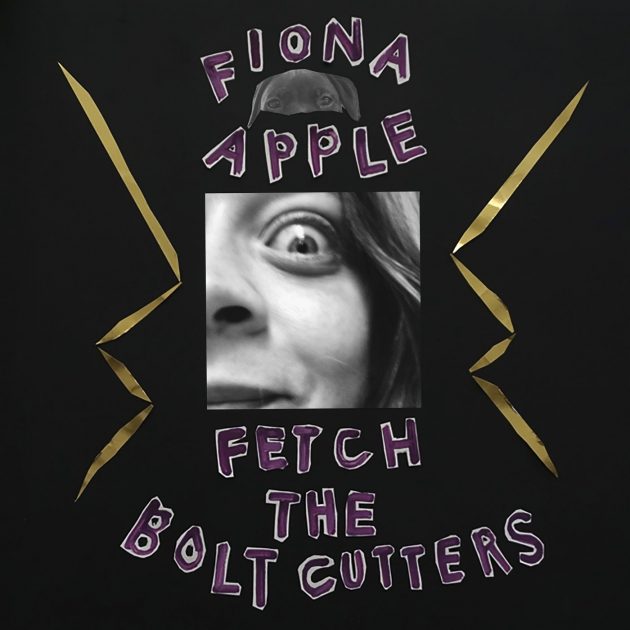
5.
Fiona Apple – Fetch the Bolt Cutters
[Epic]
Fiona Apple has always been known to take several years between albums, but her boisterous return after eight years of silence was quite a musical event to experience, particularly at the height of a pandemic. Released by Apple several months ahead of her label’s recommendation, Fetch the Bolt Cutters couldn’t have arrived at a better time – a home-recorded album about personal confinement, self-liberation and confronting inner demons, it’s a beautifully cacophonous roadmap for navigating life on lockdown. But even outside of this fitting context, the album is a brilliant work of art that speaks for itself.
Propelled by raw, improvisatory energy throughout, the songs on Fetch the Bolt Cutters are some of Apple’s most musically innovative and lyrically sharp. Over the course of 51 minutes, Apple demonstrates both the diversity of her talents and the remarkable cohesiveness of her musical vision. Like all of Apple’s music, the songs on Fetch the Bolt Cutters are grounded first and foremost in rhythm—and she has a wonderful rhythm section in Sebastian Steinberg’s upright bass playing and Amy Aileen Wood’s drumming, alongside her distinctively percussive approach to the piano. But the real backbone of the album is its unorthodox use of found-sound percussion; pots, pans, stomps and bones are just some of the instruments that make up its ‘percussion orchestra’, creating an organic palette of sounds from which Apple builds her songs.
Lyrically, Fetch the Bolt Cutters covers quite a bit of ground, reflecting on childhood trauma, sexual assault, depression, and the complexity of relationshps between women. This all could get rather heavy, yet Apple’s lyrics are lively and even humorous, every word bursting with unbroken spirit. There are plenty of moments where Apple shows off her rhythmic and alliterative genius with lines only she could have written, like “Evil is a relay sport when the one who’s burned turns to pass the torch” (“Relay”) and “Check out that rack of his, look at that row of guitar necks / Lined up like eager fillies, outstretched like legs of Rockettes” (“Rack of His”). Yet some of the most memorable lines on Fetch the Bolt Cutters are some of the most simple: “Kick me under the table all you want / I won’t shut up”; “Shameika said I had potential”; “I spread like strawberries, I climb like peas and beans,” and of course “Fetch the bolt cutters, I’ve been in here too long.” Her vocals have a sense of grit and bite to them, delivering each of these lines with a memorable punch.
Taken as a whole, Fetch the Bolt Cutters feels like the most realized version of Apple’s music yet. Gone is the elegant pop production of Jon Brion; Apple’s recordings, many of which took place in her home, are rough around the edges and full of life. Sonically, it builds on what Apple began to explore on her previous album, The Idler Wheel. But while its predecessor often felt vulnerable and exposed, Fetch the Bolt Cutters is striking in its confidence and strength.
Exuding creativity, tenacity, and madness of the best kind, Fetch the Bolt Cutters is a revelatory artistic statement and a powerfully cathartic listen from start to finish. The always-outspoken Apple has never sounded more herself than on what is undoubtedly her best work to date. – Emma Bauchner

4.
Half Waif – The Caretaker
[Anti-]
The Caretaker is a personal album – both in its content and in how the listener will hear it. The quality of Half Waif‘s album is there in clear view (the cavernous and lonely sound-worlds, the introspective disquiet in Nandi Rose’s voice, the considered arrangement of each track), and with a simple scan of the lyric sheet you can see plainly the hurt and healing Rose works through. It’s all there to be taken in, but the full heft and weight of the album may not hit immediately – or even after five listen throughs.
However, like the way Rose describes unexpectedly breaking down into her cup of coffee on the standout track “Ordinary Talk”, The Caretaker can catch you off guard, and you suddenly find yourself stopping whatever menial task you were doing to fully reckon with the everyday devastation she is laying out plainly to see. You’re suddenly caught up in her plight, and the album feels like the sorrow of a close friend you are powerless to help alleviate.
In many respects, The Caretaker arrived at just the right time this year, released as most of the western world went into lockdown, confined to their houses, flats, and rooms. Rose hones in on so many relatable feelings on her spectacular album, that listening to it for the first time you could be convinced it was written after lockdown eased. “In April I felt capable,” she confesses on “In August”, adding, “God, how has it been a year?” A feeling we all know too well, mangled by the strange way time seems to have passed.
The more you dig into the lyrics on The Caretaker, the more you can track Rose’s progress of self-love, healing, and repair. The world rushes by her on opener “Clouds Rest”, synths zipping around as she admits she’s “going nowhere fast now”; she’s processing lost friends on “In August”; and on “Halogen 2” she offers, “Don’t misunderstand / I do what I must”, a plea for surviving delivered over bending, shimmering notes and chattering drums. As the album strides into its second half, Rose looks to the future; becoming 30, changing her name, and holding out for the warmth of summer. Once again, it’s a plight that is at the core of all of us right now. The future is always there in front of us, even if there’s work to be done to get there. The Caretaker pulls up the bootstraps for you and, as its title suggests, helps you get there, one song at a time. – Ray Finlayson

3.
Boldy James & The Alchemist – The Price of Tea in China
[ALC]
Most people probably wouldn’t associate gangster rap with the adjective ‘beautiful’. The inherently political, lyrically explicit genre, with its roots in social realism, is often harsh and confrontational. Yet with The Price of Tea in China, Boldy James and The Alchemist have crafted a strangely psychedelic, nocturnal and incredibly layered record that functions on levels usually reserved for the figureheads of rap.
Opening with the haunting sample “Why are those people crying? Is it for something they’ve lost?” and delving into Boldy’s verse “My friends came and went, but most of them was murder victims,” Tea in China contrasts the cognitive dissonance between sensitive melancholic and violent hoof gangster – high art and profane hustle. Often manipulating his samples, The Alchemist’s beats have the characteristics of a hazy dream, where people and places merge and morph. The record’s interconnected flow from orchestral string arrangements to jazzy ambience and soulful ballads has a strange resemblance to Sgt. Pepper’s, while the news report samples recall Catsystem Corps’ vaporwave masterpiece News at 11.
James, meanwhile, resembles Earl Sweatshirt in his introspective tone and resigned flow. The feeling of loss permeates every second. Slowly, images form through the dense smoke, scenes play out: generational struggles between father and son, the loss of family and friends, smuggling drugs at a dimly lit port. But details remain hazy and while certain characters reappear, our protagonist remains a mystery. Maybe his inner rift signifies a confrontation with his Jungian shadow, a sort of hood Agent Cooper – which would tie to his mention of Twin Peaks in “Surf & Turf”. Maybe the two sides can’t be merged, always existing within the same, ripping the individual apart; “My son think that I don’t love ’em / He don’t know his daddy thuggin’.” Opening itself to various interpretations, maybe The Price of Tea in China is the story of a man losing that what he most loves to his own ways – a straight story of how the American dream cannibalizes itself. – John Wohlmacher

2.
Perfume Genius – Set My Heart On Fire Immediately
[Matador]
Mike Hadreas enters the new decade as a new man, 10 years on from making his debut as Perfume Genius. A throughline from 2010’s sparse Learning to the vibrant, bombastic fare of May’s Set My Heart on Fire Immediately can, of course, be traced; the days of his minimalistic fare are long behind him, but several key facets remain. His distinct artistic voice is present and accounted for: those early offerings, recounting tales of suicide, addiction and abuse, were intimate to the point of voyeurism, but then – as now – Hadreas came from a place of raw sincerity.
His circumstances have changed; he’s found love, written an album about it (namely 2017’s No Shape, arguably his breakout record) and waved goodbye to the formative surroundings of Seattle, swapping them for Los Angeles; and that personal evolution has happened in tandem with a broadening of musical horizons. You could say that Hadreas has really put his back into it, compensating for the minimalism of his first two records by expanding his sound in as many different directions as he can get away with, his heart aflame with the joy of creation.
On his fifth studio album, the elegiac opener “Whole Life” rubs shoulders with the brooding “Describe,” which is drenched in fuzz and captures the artist at his most musically brash, which in turn – via its strangely unsettling ambient coda – gives way to the slick, guitar-driven immediacy of “Without You”. This all happens over the span of 12 minutes and sounds bewildering on paper, but Hadreas is wise enough to follow through. He commits fully to these songs, most comfortable when making music on his own terms.
2014’s Too Bright – viewed as the moment that Hadreas emerged from his shell after making his mark with songs of understated beauty – was a pivot point into fresh and unfamiliar territory, and since then, Hadreas has come to revel in defying expectations. This time around, he’s more expressive than perhaps ever before as these 13 songs naturally ebb and flow, with head-turning moments aplenty. Multi-tracked vocals lift the last minute of “Your Body Changes Everything” to impressive heights; the swaggering, funk-infused pop of “On the Floor” delivers a euphoric high about halfway through as the song crests to its peak; the second and final chorus of “Nothing At All” is the release the song spends three minutes in search of, its impact nothing short of seismic.
Through it all, he is restless, suitably animated for a man who preceded this record with a dance show choreographed by Kate Wallich called The Sun Still Burns Here. That desire for physical expression is visible on the album sleeve – the artist naked from the waist up and letting himself be seen – and audible in its contents, its 51-minute running time passing in a blur as Hadreas makes the most of his eclectic streak. In no uncertain terms, he’s on fire, and this album may somehow be his best yet. – Gareth O’Malley
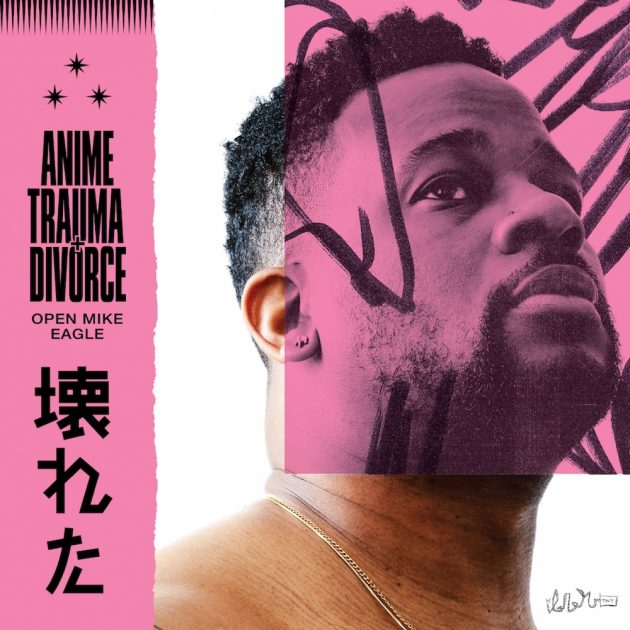
1.
Open Mike Eagle – Anime, Trauma and Divorce
[AutoReverse]
It’s not been an easy few years for Open Mike Eagle. Largely recorded in 2019, and essentially ready for release at the top of the year, the rapper and comedian could never have guessed just how bad of a year 2020 would be for all of us. When Anime, Trauma and Divorce released in the fall, and Eagle sighed, “It’s October…and I’m tired.” Yeah – we all felt that. By digging into the deeply personal, Open Mike Eagle ended up, by sheer fate, tapping into the universal.
A subtle record that somehow finds grace in the graceless, Anime, Trauma and Divorce rewards patience and understanding, something like a friend that’s nervous to be sharing just what they’re sharing but nonetheless feels simply compelled. These things had to be said. As readily as he insists, “You can’t know me, though,” there’s nothing he wishes more deeply than the contrary. As alien as we may all be to one another, this is one of those rare moments that levels the playing field, that just might bring us a bit closer together. We’re all lost, but we’re all together in that, after all.
As we sheltered in quarantine, we all dug deep into our Netflix queues and the like, allowing Eagle’s very much referential songwriting to feel more natural than it would have in any other time (watch Neon Genesis Evangelion, folks – but perhaps skip Black Mirror, lest it ruin your relationship like it did his). Still, regardless of your interest, or lack thereof, in Japanese animation and comic books, what’s absolutely sure to reach you is the sheer emotional devastation of this album. It doesn’t matter whether you’ve suffered heartbreak recently or in the distant past, Mike’s refusal to entirely give in to selfish despair, his stubborn wistfulness, and his potent, saddened humor is sure to stir up emotions, whether current or long dormant. By the time “Airplane Boneyard” hits, the ultimate truth of pure loss will stand tall: “I was ok wherever we went / now, I ain’t got no more armor.” If there’s a single sentiment that holds more true to this defeated, desiccated year, we don’t know what it is. – Chase McMullen
Catch up with the rest of our Best of 2020 content here.
Here’s the Spotify playlist of our highlights of the Top 50 Albums of 2020:

